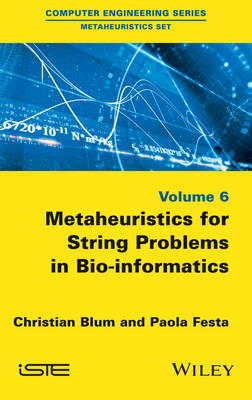
Metaheuristics for String Problems in Bio-informatics
ISTE Ltd and John Wiley & Sons Inc (Verlag)
978-1-84821-812-3 (ISBN)
One obstacle for optimization practitioners is the atypical nature of these problems which require an interdisciplinary approach in order to solve them efficiently and accurately.
Christian Blum is a senior scientist at the Spanish National Research Council (CSIC) in Bellaterra, Spain. Paola Festa is Associate Professor in Operations Research at the University of Naples Federico II, Italy.
Preface ix
Acknowledgments xi
List of Acronyms xiii
Chapter 1 Introduction 1
1.1 Complete methods for combinatorial optimization 3
1.1.1 Linear programming relaxation 6
1.1.2 Cutting plane techniques 9
1.1.3 General-purpose ILP solvers 18
1.1.4 Dynamic programming 19
1.2 Approximate methods: metaheuristics 20
1.2.1 Ant colony optimization 22
1.2.2 Evolutionary algorithms 24
1.2.3 Greedy randomized adaptive search procedures 25
1.2.4 Iterated local search 26
1.2.5 Simulated annealing 27
1.2.6 Other metaheuristics 29
1.2.7 Hybrid approaches 29
1.3 Outline of the book 32
Chapter 2 Minimum Common String Partition Problem 37
2.1 The MCSP problem 38
2.1.1 Technical description of the UMCSP problem 38
2.1.2 Literature review 39
2.1.3 Organization of this chapter 40
2.2 An ILP model for the UMCSP problem 40
2.3 Greedy approach 42
2.4 Construct, merge, solve and adapt 42
2.5 Experimental evaluation 45
2.5.1 Benchmarks 46
2.5.2 Tuning CMSA 46
2.5.3 Results 47
2.6 Future work 54
Chapter 3 Longest Common Subsequence Problems 55
3.1 Introduction 56
3.1.1 LCS problems 56
3.1.2 ILP models for LCS and RFLCS problems 59
3.1.3 Organization of this chapter 61
3.2 Algorithms for the LCS problem 61
3.2.1 Beam search 61
3.2.2 Upper bound 64
3.2.3 Beam search framework 64
3.2.4 Beam–ACO 67
3.2.5 Experimental evaluation 71
3.3 Algorithms for the RFLCS problem 75
3.3.1 CMSA 77
3.3.2 Experimental evaluation 80
3.4 Future work 85
Chapter 4 The Most Strings With Few Bad Columns Problem 87
4.1 The MSFBC problem 88
4.1.1 Literature review 88
4.2 An ILP model for the MSFBC problem 89
4.3 Heuristic approaches 90
4.3.1 Frequency-based greedy 91
4.3.2 Truncated pilot method 91
4.4 ILP-based large neighborhood search 92
4.5 Experimental evaluation 94
4.5.1 Benchmarks 94
4.5.2 Tuning of LNS 96
4.5.3 Results 97
4.6 Future work 104
Chapter 5 Consensus String Problems 107
5.1 Introduction 107
5.1.1 Creating diagnostic probes for bacterial infections 108
5.1.2 Primer design 108
5.1.3 Discovering potential drug targets 108
5.1.4 Motif search 109
5.2 Organization of this chapter 110
5.3 The closest string problem and the close to most string problem 110
5.3.1 ILP models for the CSP and the CTMSP 111
5.3.2 Literature review 112
5.3.3 Exact approaches for the CSP 113
5.3.4 Approximation algorithms for the CSP 113
5.3.5 Heuristics and metaheuristics for the CSP 114
5.4 The farthest string problem and the far from most string problem 117
5.4.1 ILP models for the FSP and the FFMSP 117
5.4.2 Literature review 118
5.4.3 Heuristics and metaheuristics for the FFMSP 119
5.5 An ILP-based heuristic 141
5.6 Future work 146
Chapter 6 Alignment Problems 149
6.1 Introduction 149
6.1.1 Organization of this chapter 150
6.2 The pairwise alignment problem 151
6.2.1 Smith and Waterman’s algorithm 154
6.3 The multiple alignment problem 157
6.3.1 Heuristics for the multiple alignment problem 161
6.3.2 Metaheuristics for the multiple alignment problem 162
6.4 Conclusion and future work 173
Chapter 7 Conclusions 175
7.1 DNA sequencing 175
7.1.1 DNA fragment assembly 176
7.1.2 DNA sequencing by hybridization 177
7.2 Founder sequence reconstruction 180
7.2.1 The FSRP problem 181
7.2.2 Existing heuristics and metaheuristics 182
7.3 Final remarks 184
Bibliography 187
Index 205
| Verlagsort | London |
|---|---|
| Sprache | englisch |
| Maße | 165 x 241 mm |
| Gewicht | 485 g |
| Themenwelt | Mathematik / Informatik ► Informatik ► Theorie / Studium |
| Naturwissenschaften ► Biologie | |
| Technik ► Elektrotechnik / Energietechnik | |
| ISBN-10 | 1-84821-812-5 / 1848218125 |
| ISBN-13 | 978-1-84821-812-3 / 9781848218123 |
| Zustand | Neuware |
| Haben Sie eine Frage zum Produkt? |
aus dem Bereich


